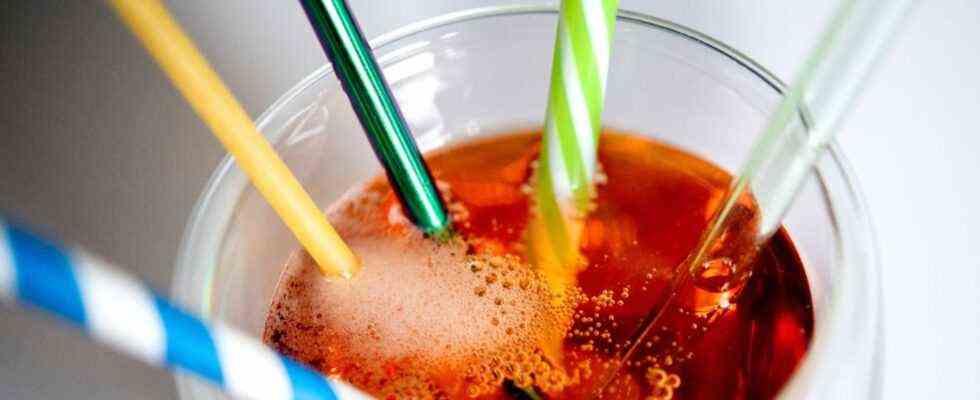Fight against plastic waste
Paper, glass or macaroni: which straw alternative is the best?
In contrast to other EU countries, drinking straws made from biodegradable plastic are also prohibited in Germany (symbol image)
© Hauke-Christian Dittrich / DPA
Plastic drinking straws were banned across Europe 100 days ago. In the meantime, one encounters numerous alternatives made of wood, glass, paper or even durum wheat in the form of macaroni noodles in restaurants and pubs. Which straw alternative is really convincing?
People with xylophobia have been forced to deal with their disease almost every day for the past three months. The technical term describes the fear of wood in the mouth, i.e. when you can hardly bear it to lick ice cream sticks, to taste on the wooden spoon or to think the scratchy feeling of the wood fibers on the tongue is disgusting. Since the EU’s ban on plastic drinking straws came into effect in Germany, “xylophobes” can hardly escape their fears. Because in many restaurants alternatives to plastic straws are served – often made of wood.
100 days without plastic straws
It’s about the fight against plastic waste. Saying goodbye to the often brightly striped plastic straw was the order of the day on July 3rd, around 100 days ago. The straws fall under the Europe-wide ban on the sale of single-use plastic items (this was set out in EU Directive 2019/904 of June 5, 2019). Single-use products that are still in stock can still be sold and used, which is why the new regulation is only gradually becoming noticeable in everyday life. Sure, you can simply drink without a straw or use alternatives made of glass, cardboard or metal. But even there, hardship lurks for some. Often there is now tube noodles to drink – maccheroni (German: macaroni). Of course, there is always the option of taking your own copy to the cocktail bar according to your own needs.
“Basically, a person can develop a phobia of anything – depending on the origin of the fears,” says Munich psychologist Cornelia Lohmeier. There are also reservations about contact with plastic, which is why the question of phobia arose beforehand. In this respect, an increase in the problem is not necessarily to be expected, says the expert.
There is no simple explanation for the development of phobias. Rather, the causes are individually very different. For those affected, however, phobias are a serious condition that can make everyday life considerably more difficult. Aside from avoiding unpleasant stimuli, Lohmeier emphasizes that there is also the option of getting professional therapeutic help.
There is chaos in the drinking straw market
The Alpiplast company in South Tyrol is one of the largest drinking straw manufacturers in Europe. The company in Partschins near Merano and Bozen has been producing drinking straws for 50 years and delivering them all over the world. Hundreds of millions of stalks leave the factory every year.
When asked, a spokeswoman said: “At the moment there is complete chaos on the market, the EU regulation on the ban on plastics is in force, but some of the individual states have failed to enact their own law.” In Italy, Denmark or Belgium, for example, it is allowed to use biodegradable drinking straws. Germany and other countries, however, only allowed paper straws and no biodegradable drinking straws. In many countries there is still no information on this.
Germany also bans biodegradable drinking straws
The Federal Environment Ministry defends its strict line, because it is “not guaranteed” that plastics certified as biodegradable beyond special composting plants, “especially in marine waters”, actually break down.
According to the northern Italian company, the organic drinking straws from Alpiplast are made from the wood component lignin, sugar cane with PLA (lactic acid molecules), coffee granules or bamboo powder.
Federal institute advises against paper and cardboard
Germany’s Federal Institute for Risk Assessment (BfR), an institution under public law that provides the federal government with scientific advice on food safety issues, explains the alternatives to plastic in view of the one-way plastic ban, a drastic measure in the fight against plastic waste. Consumers are warned against drinking straws made from real straw, as there is a risk of germs or mold toxins.
Drinking straws out silicone, stainless steel or Glass on the other hand, are recommended for repeated use, according to the BfR on its website. “Metal should comply with the requirements of the Council of Europe resolution on metals and alloys.” And glass should of course be unbreakable. In the case of drinking straws made of paper and cardboard, wet strength agents are added to prevent soaking. Residues of these substances, especially chloropropanols, can migrate into the food.
And what about pasta, according to the BfR? “If a drinking straw is only to be used once, there is nothing in terms of health against the use of products made from durum wheat (for example raw macaroni noodles). However, the noodles could dissolve, especially in warm and hot drinks or over a longer period of time, and thus become unusable. In addition, they could change the consistency and taste of the drink. Only noodles from industrial production should be used that do not contain an egg as an ingredient. “

See in the video: They are known, well-intentioned advice against hiccups – few really help. But a Texas anesthetist has now developed a method that is said to alleviate nine out of ten hiccups.
This article contains so-called affiliate links. Further information are available here.

